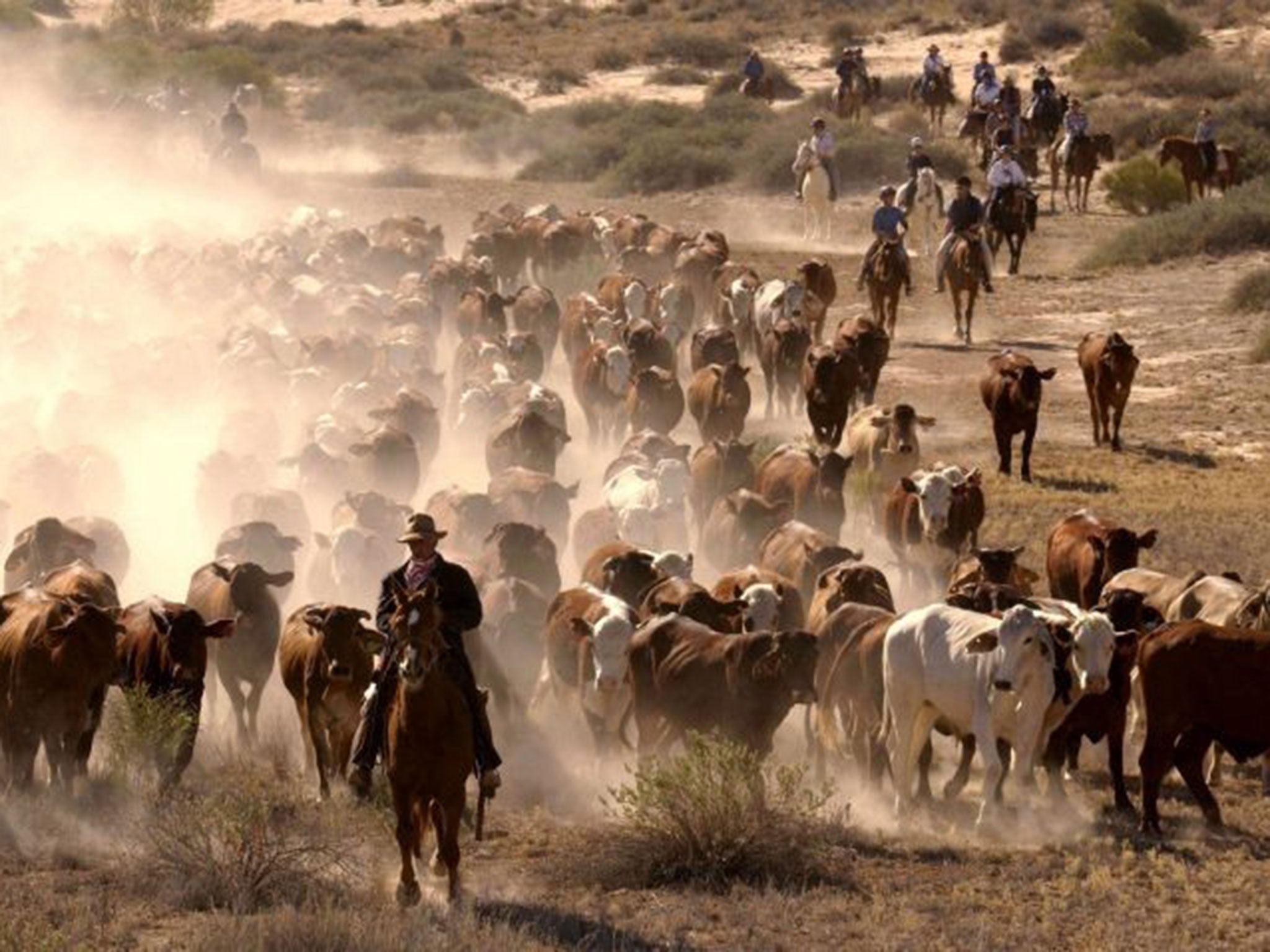From iron ore to cattle farming: Meat is a richer seam for miners
In Western Australia, industry giants such as Rio Tinto are turning increasingly to cattle farming as beef prices soar and iron ore goes the other way

Your support helps us to tell the story
From reproductive rights to climate change to Big Tech, The Independent is on the ground when the story is developing. Whether it's investigating the financials of Elon Musk's pro-Trump PAC or producing our latest documentary, 'The A Word', which shines a light on the American women fighting for reproductive rights, we know how important it is to parse out the facts from the messaging.
At such a critical moment in US history, we need reporters on the ground. Your donation allows us to keep sending journalists to speak to both sides of the story.
The Independent is trusted by Americans across the entire political spectrum. And unlike many other quality news outlets, we choose not to lock Americans out of our reporting and analysis with paywalls. We believe quality journalism should be available to everyone, paid for by those who can afford it.
Your support makes all the difference.The mining giant Rio Tinto is the world’s second-largest exporter of iron ore. It’s also one of Western Australia’s biggest cattle ranchers, with room for a herd of 25,000 to graze on land spanning an area larger than Connecticut.
Global demand for beef is surging, driven in large part by China’s expanding appetite. At the same time, prices for iron ore are projected to slip. That’s making cattle more attractive to Australian mining companies – a complementary business that generates revenue from land that would otherwise lie idle.
Also moving into the cattle industry is Hancock Prospecting, the mining company owned by Gina Rinehart, Australia’s richest woman, and Andrew Forrest, the billionaire founder of Fortescue Metals, the world’s fourth- biggest iron ore exporter.
“The trouble with iron ore is you have to dig it out and move it by truck, but the great thing about cattle is they walk there for you,” said the Australian agriculture minister Barnaby Joyce. For mining companies, “it’s just the movement of another commodity”.
Purchases of Australian food and agriculture assets have had the strongest first half in at least 12 years, with more than 20 deals announced this year worth at least $2.6bn (£1.6bn), according to data compiled by Bloomberg.
They include Mr Forrest’s acquisition in May of Harvey Beef, Western Australia’s only licensed beef exporter to China, and Hancock’s purchase of a 50 per cent share last month in two cattle stations, or ranches, in Western Australia’s Kimberley region.
Mr Joyce expects more such deals by mining companies: “They are key people with the right expertise to make this work.”
This year Mr Forrest, who once farmed alpacas and grew up on his family’s ranch, founded the Australia-Sino 100-Year Agricultural and Food Safety Partnership to facilitate discussions between Australian suppliers and Chinese consumers.
He held talks with the Chinese Premier Li Keqiang in April to discuss the partnership. The world’s most populous nation is so desperate for good beef that Mr Forrest told Bloomberg News in May that he would be taking steak samples in his luggage on his next trip. According to government figures, he wouldn’t have much trouble finding takers: beef and veal exports from Australia to China have surged 76 per cent this year.
China is already the biggest consumer of meat and may double beef imports by 2018 as the country’s rising wealth drives changes in consumers’ diets, Rabobank International said in December.
Rio Tinto has six ranches in the Pilbara region of Western Australia, covering more than 5,791 square miles of land, providing scope for exploration, infrastructure development, water management and future mining and production, according to its website.
With Australia’s vast expanses of land, said Sam Walsh, Rio’s chief executive, in Perth last month, “we are conscious of an opportunity in relation to agriculture”.
Australia’s benchmark Eastern Young Cattle Indicator has gained 14 per cent this year after two years of declines. That makes this a good time to move into beef, said Paul Deane, a senior agriculture analyst at Australia and New Zealand Banking.
“You’re are buying at the bottom of the cycle and that’s attractive,” he added.
In the US, cattle prices are up 26 per cent over the past year on Chicago’s futures exchange, and set for a sixth annual gain as increases in consumer spending help the economy rebound. Prices rose to a record last month as slaughter numbers declined.
By contrast, iron ore prices are expected to fall to $96 a ton in 2018, from a forecast of $102.50 in the current quarter, according to data compiled by Bloomberg.
Mining companies in Australia have long been associated with farming and have often bought properties to ease access for exploration and mining. Many mines share the same name as the stations where they’re located, including Rio’s Hamersley Iron and Fortescue’s Christmas Creek.
Ms Rinehart spent part of her childhood growing up on the Mulga Downs station. Her father, Lang Hancock, discovered the outcroppings of iron ore in Western Australia that made the nation the world’s biggest exporter.
BHP Billiton, the world’s biggest miner, which is based in Melbourne, Victoria, holds pastoral leases in Queensland and Western Australia. A BHP spokesman declined to comment on whether the company plans to add to its holdings of pastoral land.
Mining companies “have extensive cattle operations and they will look to maximise the return on those investments,” said Rob McConnel, Deloitte’s national agribusiness leader. “The time is right for doing exactly that.”
(c) Bloomberg News
Join our commenting forum
Join thought-provoking conversations, follow other Independent readers and see their replies
Comments